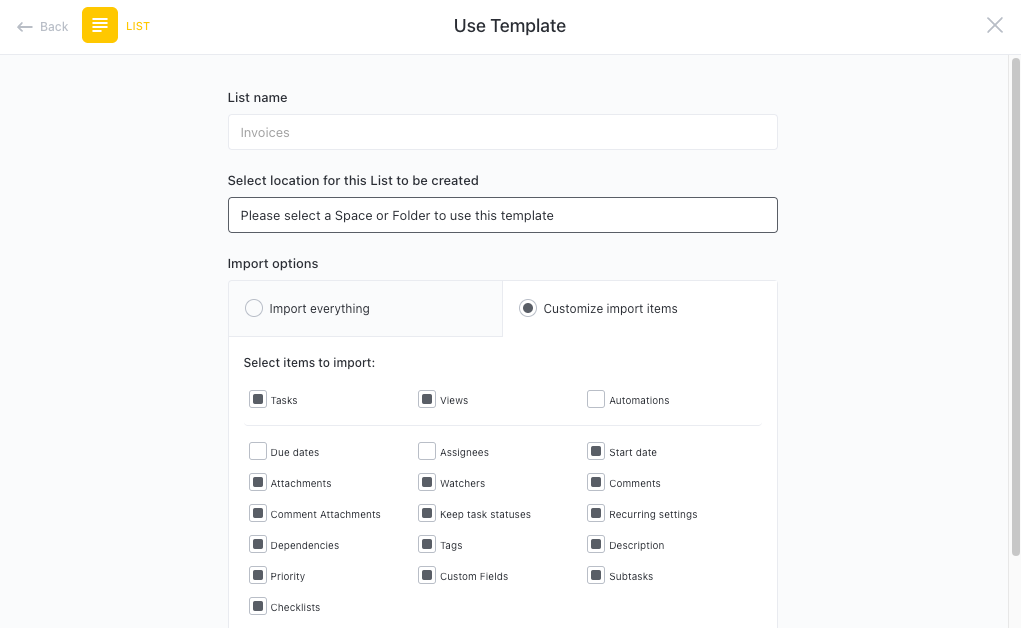As a policy analyst, tracking and measuring key performance indicators (KPIs) is crucial for assessing the impact and effectiveness of your policy development and implementation processes. But keeping track of all those KPIs can be overwhelming and time-consuming. That's where ClickUp's Policy Analysts KPI Tracking Template comes in to save the day!
With ClickUp's template, you can easily:
- Define and track KPIs specific to your policy goals and objectives
- Monitor progress and performance across different policy areas
- Analyze data and generate reports to inform decision-making and policy adjustments
Don't let KPI tracking slow you down. Use ClickUp's template to streamline your process and drive meaningful policy change faster and more efficiently.
Benefits of Policy Analysts KPI Tracking Template
Keeping track of KPIs is crucial for policy analysts to evaluate the impact and effectiveness of their policy initiatives. ClickUp's Policy Analysts KPI Tracking Template offers numerous benefits, including:
- Streamlining the monitoring and evaluation process, ensuring accurate data collection
- Providing a comprehensive overview of policy outcomes and their alignment with organizational goals
- Identifying areas of improvement and making data-driven decisions to enhance policy effectiveness
- Enhancing transparency and accountability by tracking stakeholder engagement and feedback
- Ensuring compliance with regulatory frameworks and evaluating policy impact on a regular basis.
Main Elements of Policy Analysts KPI Tracking Template
ClickUp's Policy Analysts KPI Tracking template is designed to help you effectively track and manage key performance indicators for your policy analysis projects.
Key elements of this template include:
- Custom Statuses: Track the progress of your KPIs with statuses such as Completed, Off Track, On Track, Not Started, and At Risk, allowing you to easily identify the current status of each KPI.
- Custom Fields: Utilize 7 custom fields including Progress, Department, Target Value, Actual Value, KPI, Difference, and Variance to input and track specific data related to each KPI, ensuring accurate and comprehensive tracking of your policy analysis progress.
- Custom Views: Access 5 different views including the Summary view, Getting Started Guide view, Departmental OKR view, Progress view, and Timeline view to gain different perspectives and insights into your KPI tracking process, allowing you to effectively monitor progress, set goals, and plan for the future.
How to Use KPIs for Policy Analysts
Tracking key performance indicators (KPIs) is crucial for policy analysts to evaluate the effectiveness of their work. Follow these steps to effectively use the Policy Analysts KPI Tracking Template in ClickUp:
1. Define your KPIs
Start by identifying the specific KPIs that are most relevant to your policy analysis work. These could include metrics such as the number of policy recommendations implemented, stakeholder satisfaction ratings, or the impact of policy changes on target populations.
Use custom fields in ClickUp to define and track each KPI, ensuring that you have a clear understanding of what you need to measure and monitor.
2. Set measurable targets
Establish specific, measurable targets for each KPI to track progress and evaluate performance. These targets should align with the goals of your policy analysis projects and provide a benchmark for success.
Use custom fields in ClickUp to set target values for each KPI, making it easy to track progress and identify areas that need improvement.
3. Collect data
Gather data related to each KPI on a regular basis. This could involve conducting surveys, analyzing policy documents and reports, or monitoring relevant indicators and trends.
Use tasks in ClickUp to assign data collection responsibilities to team members, ensuring that data is collected consistently and efficiently.
4. Input data into the template
Enter the collected data into the Policy Analysts KPI Tracking Template in ClickUp. This template provides a structured format for organizing and analyzing your data, making it easier to identify trends, track progress, and evaluate performance against targets.
Use the Table view in ClickUp to input and visualize your data, allowing you to easily compare actual performance with target values.
5. Analyze and take action
Regularly review and analyze the data in your KPI Tracking Template to gain insights into the effectiveness of your policy analysis work. Identify areas of success and areas for improvement, and use this information to inform future policy decisions and recommendations.
Use Dashboards in ClickUp to visualize your KPI data, allowing you to easily track trends, monitor performance, and make data-driven decisions.

Get Started with ClickUp’s Policy Analysts KPI Tracking Template
Policy analysts can use this KPI Tracking Template to effectively measure and track policy development and implementation processes.
First, hit “Add Template” to sign up for ClickUp and add the template to your Workspace. Make sure you designate which Space or location in your Workspace you’d like this template applied.
Next, invite relevant members or guests to your Workspace to start collaborating.
Now you can take advantage of the full potential of this template to track policy KPIs:
Use the Summary View to get an overview of all policy KPIs and their progress
The Getting Started Guide View will provide step-by-step instructions on how to set up and use the template effectively
The Departmental OKR View helps align policy KPIs with organizational objectives and key results
Utilize the Progress View to track the progress of each policy KPI and identify bottlenecks or areas that require attention
The Timeline View provides a visual representation of the timeline for policy development and implementation
Organize policy KPIs into five different statuses: Completed, Off Track, On Track, Not Started, At Risk, to keep track of progress
Update statuses as you make progress or encounter challenges to keep stakeholders informed
Monitor and analyze policy KPIs to ensure effective policy development and implementation.








